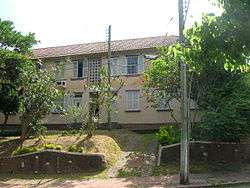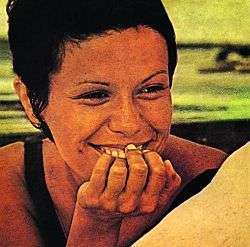Elis Regina
| Elis Regina | |
|---|---|
|
Elis Regina | |
| Background information | |
| Birth name | Elis Regina Carvalho Costa |
| Also known as | Pimentinha, Furacão |
| Born |
March 17, 1945 Porto Alegre, Brazil |
| Died |
January 19, 1982 (aged 36) São Paulo, Brazil |
| Genres | MPB, samba, pop, rock, jazz, bossa nova |
| Occupation(s) | Singer |
| Years active | 1961–1982 |
Elis Regina Carvalho Costa (Portuguese pronunciation: [eˈlis ʁeˈʒinɐ]; March 17, 1945 – January 19, 1982), popularly known as Elis Regina, was a Brazilian singer of popular and Jazz music.[1]
She became nationally renowned in 1965, after singing "Arrastão" (composed by Edu Lobo and Vinícius de Moraes) in the first edition of TV Excelsior festival song contest, and soon joined O Fino da Bossa, a television program on TV Record. Elis was noted for her vocalization, as well as for her personal interpretation and performances in shows. She recorded several successful compositions, such as "Como nossos pais" (Belchior), "Upa Neguinho" (E. Lobo and Gianfrancesco Guarnieri), "Madalena" (Ivan Lins), "Casa no Campo" (Zé Rodrix and Tavito), "Águas de Março" (Tom Jobim), "Atrás da porta" (Chico Buarque and Francis Hime), "O bêbado e a equilibrista" (Aldir Blanc and João Bosco), "Conversando no bar" (Milton Nascimento), etc.
Her death, at the age of 36, shocked Brazil. She has frequently been regarded as the greatest Brazilian singer of all time by critics, musicians, and commentators.[2][3][4][5][6]
Biography

Elis Regina was born in Porto Alegre, where she began her career as a singer at age 11 on a children's radio show, O Clube Do Guri on Rádio Farroupilha. In 1959, she was contracted by Rádio Gaúcha and in the next year she travelled to Rio de Janeiro where she recorded her first LP, Viva a Brotolândia (Long Live Teenage Land) and her second LP, "Poema".,[2] employing a number of popular musical styles of the era.
She won her first festival song contest in 1965 singing Arrastão (Pull The Trawling Net)[7] by Edu Lobo and Vinícius de Moraes, which, when released as a single, made her the biggest selling Brazilian recording artist since Carmen Miranda. The second LP with Jair Rodrigues, Dois na Bossa, set a national sales record and became the first Brazilian LP to sell over one million copies. Arrastão by Elis also launched her career for a national audience, since that festival was broadcast via TV and radio. For the history of Brazilian music, the record represented the beginning of a new musical style that would be known as MPB (Música popular brasileira or Brazilian Popular Music), distinguished from the previous bossa nova and other preceding musical styles, although samba is very much at its core. Most of her entire 20 year recorded discography is still available.
In the late 1960s and early 1970s, along with Gal Costa, Caetano Veloso and Gilberto Gil, Elis Regina helped to popularize the work of the tropicalismo (Tropicália) movement, recording songs by musicians such as Gilberto Gil. Her 1974 collaboration with Antonio Carlos Jobim, Elis & Tom, is often cited as one of the greatest bossa nova albums of all time, which also includes what many consider the all-time best Brazilian song, "Águas de Março". She also recorded songs by Milton Nascimento, João Bosco, Aldir Blanc, Chico Buarque, Guinga, Jorge Ben, Baden Powell, Caetano Veloso and Rita Lee. Her nicknames were "furacão" ("hurricane") and "pimentinha" ("little pepper"), opening a window on both her singing style and personality.
She sometimes criticized the Brazilian dictatorship which had persecuted and exiled many musicians of her generation. In a 1969 interview in Europe, she said that Brazil was being run by "gorillas". Her popularity kept her out of jail, but she was eventually compelled by the authorities to sing the Brazilian national anthem in a stadium show, drawing the ire of many Brazilian Leftists. She was later forgiven because they understood that, as both a mother and daughter, she had to protect her family from the dictatorship at any cost. Along with many other artists Elis was living each verse of Geraldo Vandré's political hymn:[8] Yet they make of a flower their strongest refrain, And believe flowers to defeat guns. While her earlier records were mostly apolitical, from the mid-'70s on her music became more engaged, and she began to choose compositions and structure her conceptually complex live shows in ways as to criticize the military government, capitalism, racial and sexual injustice and other forms of inequality. Lyrics to songs recorded towards the end of her career carried overt socialist leanings, and in 1980, she joined the Workers' Party.
Her rendition of Jobim / Vinicius' song "Por Toda A Minha Vida" appeared on the soundtrack to the 2002 movie Hable con Ella (Talk to Her) directed by Pedro Almodóvar and her song "Roda" appeared on the soundtrack to the 2005 movie Be Cool.
Family
Elis married twice and gave birth to three children. Her first marriage was to Ronaldo Bôscoli in 1967. She gave birth to a son, João Marcelo Bôscoli, in 1970. She later married her long-time collaborator, pianist/composer/arranger César Camargo Mariano, and had two more children with him: Pedro Camargo Mariano in 1975, and Maria Rita in 1977. The three children all later became musicians and/or producers. After many years of complete obscurity, Maria Rita became a national singing sensation after a lengthy marketing campaign, like her mother, winning three Latin Grammies for her debut eponymous CD. João Marcello Boscoli, owner of the Trama recording company, produced the first Elis Regina DVD allowing many of her fans to see her performing for the first time. The DVD was a recording of a 1973 Brazilian TV show featuring songs, Elis' running commentary introducing each song, and an interview. Pedro Camargo Mariano most recently sang with his father, the brilliant pianist and arranger César Camargo Mariano, on a Latin Grammy–nominated CD called "Piano & Voz" (Piano and Voice). More DVDs of Elis Regina performances have subsequently been released.
Death
Elis Regina died at the age of 36 in 1982, from an accidental cocaine, alcohol, and temazepam interaction.[1] More than 15,000 people, among friends, relatives and fans, held her wake at Teatro Bandeirantes, in São Paulo, with large groups of fans singing her songs. More than 100,000 people followed her funeral procession throughout São Paulo. She was buried in Cemitério do Morumbi.[9]
Biography
Regina Echeverria Portuguese: Furacão Elis by Regina Echeverria
English: Furacão Elis by Regina Echeverria –English translation Robert St-Louis [10] Chronology of Elis' life: Chronology
Discography
- 1961: Viva a Brotolândia (first album, recorded in 1961 at age 16)
- 1962: Poema de Amor
- 1963: Ellis Regina (listed with two l's)
- 1963: O Bem do Amor
- 1965: Dois na Bossa
- 1965: O Fino do Fino – Elis & Zimbo Trio
- 1965: Samba, Eu Canto Assim!
- 1966: Dois na Bossa nº2
- 1966: Elis
- 1967: Dois na Bossa nº3
- 1968: Elis Especial
- 1969: Elis, Como & Porque
- 1969: Elis Regina in London
- 1969: Honeysuckle Rose Aquarela Do Brasil – Elis Regina & Toots Thielemans
- 1970: Em Pleno Verão
- 1970: Elis no Teatro da Praia com Miele & Bôscoli
- 1971: Ela
- 1972: Elis
- 1973: Elis - no 2
- 1973: Elis
- 1974: Elis
- 1974: Elis & Tom
- 1976: Falso Brilhante
- 1977: Elis
- 1978: Transversal do Tempo (live)
- 1978: Vento de Maio
- 1979: Essa Mulher
- 1979: Elis Especial
- 1980: Saudades do Brasil
- 1980: Elis
- 1982: Montreux Jazz Festival 1979, with Hermeto Pascoal (16 tracks)
- 1982: Trem Azul (live) – a bootleg of her final live recording.
- 1984: Luz das Estrelas
- 1987: Personalidade (compilation)
- 1994: Elis Regina no Fino da Bossa (live)
- 1994: Dose Dupla-Elis Regina (digital compilation of her first 2 recordings from 1961 and 1962)
- 1995: Elis ao Vivo (live)
- 2001: Sucessos Inesquecíveis de Elis Regina (5 cd box set compilation)
- 2002: 20 Anos de Saudade (compilation)
- 2004: Little Pepper: The Definitive Collection (compilation)
- 2005: Elis Regina: MPB Especial 1973 – black and white DVD released in 2005 (TV show)
- 2006: Elis Regina Carvalho Costa – live show on DVD (color)
- 2006: Elis full color 3 DVD box set – composed of Na Batucada da Vida, Doce de Pimenta, and Falso Brilhante
- 2006: Por Toda a Minha Vida – Brazilian TV GLOBO special in December 28, 2006 (TV show)
- 2006: Pérolas Raras
- 2012: Um Dia - the complete 27 tracks of the afternoon and night shows at the Montreux Jazz Festival 1979 (Warner); prev. released in part in 1982
Further reading
- KIECHALOSKI, Zeca (1984) Elis Regina. Col. Esses Gaúchos. Porto Alegre: Tchê! 101p.
- ECHEVERRIA, Regina (1985) Furacão Elis. Inclui cronologia e discografia por Maria Luiza Kfouri. Rio de Janeiro: Nórdica / Círculo do Livro. 363p. 2.ed. rev. ampl. 1994 (São Paulo: Ed. Globo); 3.ed. 2002 (São Paulo: Ed. Globo). 239p. ISBN 85-250-3514-9
- Elis Regina Por Ela Mesma. (1995) Org. Osny Arashiro. São Paulo: Martin Claret. 2.ed. rev. 2004. 229p. ISBN 85-7232-085-7
- O Melhor de Elis Regina. (2003) Melodias cifradas com as letras de 28 músicas do repertório de Elis Regina. Ed. Irmãos Vitale. 112p. ISBN 85-7407-088-2
- SARSANO, José Roberto. (2005) Boulevard des Capucines. Teatro Olympia, Paris 1968: Elis Regina e Bossa Jazz Trio em uma época de ouro da MPB. Ed. Árvore da Terra. 207p. ISBN 85-85136-29-4
- GOÉS, Ludenbergue. Mulher brasileira em primeiro lugar: o exemplo e as lições de vida de 130 brasileiras consagradas no exterior. Ediouro Publicações, 2007. ISBN 85-00-01998-0
- Ricardo Pugialli, Almanaque da Jovem guarda: nos embalos de uma década cheia de brasa, mora?. Ediouro Publicações, 2006. ISBN 85-00-02073-3
- Walter Silva, Vou te contar: histórias de música popular brasileira. Conex, 2002. ISBN 85-88953-05-6
- Osny Arashiro, Elis Regina por ela mesma. M. Claret, 1995.
References
- 1 2 The Brazilian sound: samba, bossa nova, and the popular music of Brazil By Chris McGowan, Ricardo Pessanha. Temple University Press. p.82
- 1 2 "Elis Regina (1945–1982)". Federative Republic of Brazil. Retrieved 2010-12-03.
- ↑ Goés, 2007, p.187
- ↑ Pugialli, 2006, p.170.
- ↑ Silva, 2002, p.193.
- ↑ Arashiro, 1995, p.39.
- ↑ Arrastão venceu fácil, mas outra música de Vinícius não convenceu Banco de dados: Folha de S.Paulo (Portuguese)
- ↑ Ainda fazem da flor seu mais forte refrão, E acreditam nas flores vencendo o canhão
- ↑ "O amargo brilho do pó" (in Portuguese). Veja. Retrieved 2010-12-13.
- ↑ http://www.connectbrazil.com/elis/main/elisregina.htm
External links
| Wikimedia Commons has media related to Elis Regina. |
- Videos e history (Portuguese)
- "Elis Regina". Find a Grave. Retrieved September 3, 2010.
- Billboard.com Biography of Elis Regina
- Elis Regina discography at Discogs
- Chronology (English) from Furacão Elis The biography by Regina Echeverria
